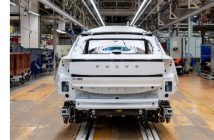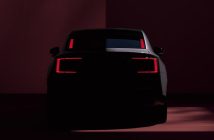+++ AUDI executives have already dropped plenty of hints suggesting the company was considering an electric sports car and now new details are starting to emerge about the model. Audi is working on a 4-seat sports car which has been dubbed the E-Tron GT. The model is reportedly a 4-door sedan with coupe-like styling. The car is also slated to adopt the company’s new E-Tron design language which has been shown on various concepts including the E-Tron Quattro and E-Tron Sportback. The car will be heavily influenced by the Porsche Mission E and have an electric powertrain that produces 600 hp. Additional information is limited but the report claims the car will have all-wheel drive and a floor-mounted lithium/ion battery that enables the vehicle to travel more than 500 km on a single charge. When battery is depleted, the E-Tron GT’s rapid charging system could enable the model to have 400 km of range in as little as 15 minutes. The E-Tron GT could be launched in 2022 and have a base price of less than 100,000 euro. +++
+++ CHINA is one of the largest automotive markets in the world and autonomous driving technology is poised to make traveling in its density populated cities much easier. However, fears of spying could derail this utopian dream. Chinese officials are afraid that high-resolution images and GPS data recorded by mapping vehicles could pose a threat to national security. As a result, the country has reportedly placed restrictions on foreign automakers and their autonomous driving programs. According to a representative of an unnamed automaker, “We have some obstacles related to testing of automated functionalities, but this is a delicate thing”. They added the issue centers on taking “photos and recording GPS coordinates” as these things are “connected with national defense policies”. China’s Ministry of Industry and Information Technology wasn’t available to comment, but Chinese automakers aren’t subject to the same restrictions. Even foreign automakers who aren’t dissuaded from testing autonomous vehicles in China are forced to partner with one of nearly a dozen Chinese companies which specialize in high-definition mapping. China in the process of developing new regulations for autonomous vehicles and Baidu believes the rules could allow fully autonomous vehicles to be tested in the country as early as February. +++
+++ Wards Auto has released its annual list of the 10 Best ENGINES for 2018. After spending 2 months testing 32 different powertrains, the company’s editors selected the winners. Surprisingly, the winners were primarily from mainstream brands and the publication notes not a single German automaker made the list. Ford came away with 2 wins as editors loved the twin-turbo 2.7-liter V6 in the F-150 as well as the 5.0-liter V8 engine that resides in the Mustang GT. Other winners include the turbocharged 2.0-liter 4-cylinder in the Honda Civic Type R and the twin-turbo 3.0-liter V6 that powers the Infiniti Q50. Jaguar and Kia also appeared on the top10 list for the first time thanks to the turbocharged 2.0-liter 4-cylinder in the XF and the turbocharged 3.3-liter V6 in the Stinger. Alternative powertrains had a strong showing as well as Wards honored the Chevrolet Bolt (Opel Ampera-e), Chrysler Pacifica Hybrid, Honda Clarity, and Toyota Camry Hybrid. These models are a very diverse group as the cars have electric, plug-in hybrid, fuel-cell, and hybrid powertrains. Performance models were largely absent from the list even though contenders included the Audi RS3 and S4. The sole diesel engine, the turbocharged 1.6-liter 4-cylinder in the Chevrolet Equinox, also failed to make the cut. +++
+++ Volvo owner GEELY will buy 3-5 percent of Mercedes-Benz’s parent company at a cost of 4 billion euro, according to Chinese state media. The acquisition would make Geely the third-biggest Daimler shareholder, overtaking the Renault-Nissan-Mitsubishi Alliance, which owns 3.1 percent. Currently, 70.7 percent of Daimler is owned by institutional investors, while 19.4 percent is owned by private investors. Kuwait holds a 6.8 percent stake. Daimler previously rejected an offer by Geely to buy a stake at a reduced rate, but told the Chinese company that it could buy shares in the open market. The move is part of an aggressive expansion by Geely, which shot to prominence in Europe after acquiring Volvo in 2010 from Ford and went on to buy The London Taxi Company in 2012. It established the Lynk&Co brand in 2016 and acquired a majority stake in Lotus and almost half of Proton parent company DRB-Hicom this year. Geely also recently bought the American flying car start-up Terrafugia, with an ambition to launch its first flying vehicle in 2019. +++
+++ OPEL / VAUXHALL’s decision earlier this year to cut 400 jobs at its Ellesmere Port plant was “nothing to do with output or performance”, according to boss Rory Harvey. He attributed the move to “segment shifts” across Europe, highlighting the growing trend for SUVs in place of models such as the Astra, which is built at Ellesmere Port. The news in October that the plant near Liverpool would scrap 400 roles came 3 months after French car maker PSA Group, which also owns Citroën, DS and Peugeot, completed its acquisition of Vauxhall and its European counterpart Opel. At the time, PSA said manufacturing costs at Ellesmere Port were higher than other “benchmark plants” in the group. The facility will move staff from 2 production shifts to 1 in early 2018. Since then, PSA and Vauxhall/Opel has announced a turnaround plan that includes launching all cars on PSA platforms and setting the goal of keeping all current plants (including Ellesmere Port and Luton in the UK) open, although potentially on altered terms. Harvey said today: “I’m very excited in terms of what’s going on. There’s a lot of transition, a lot of change. But if you look at some of the fundamentals now, we’re moving very swiftly. One thing that isn’t necessarily a positive, but happened on a voluntary basis, is that we took some cost out of the plant at Ellesmere Port and some people put their hand up to help us get to where we need to. That’s nothing to do with output or performance, but segment shifts in the market throughout Europe. When you’ve got one product on a line, if you get shifts in market you have to align your resources”. Harvey continued: “I’ve been a Vauxhall employee for 28 years and it feels a bit different to have a new owner. But we have to get on the front foot and we have to get the business turned around, and we have to get ourselves in a competitive position. Vauxhall has a great heritage”. He also acknowledged that next year will be a challenge for the car industry in terms of sales, with uncertainty this year likely continue. Talking about 2018, Harvey said: “We think Q1 may be down on this year, and Q2-4 will be flat”. +++
+++ It’s not just PORSCHE that was surprised by the increased demand for the hybrid Panamera; its battery suppliers didn’t see it coming either. Following the news that 60 percent of all second-gen Panameras sold are hybrids, the German car maker is pushing its battery suppliers to their limits. Gerd Rupp, head of Porsche’s Leipzig factory where the Panamera is assembled, said: “At present we are able to meet customer demand well”, though he conceded that “there are limits, because we are dependent on the capacities of battery suppliers. We had originally projected different volumes of battery systems needed”, Rupp commented. “The effects can be seen in longer delivery times of currently 3-4 months for Panamera hybrid models”. Furthermore, Porsche expects demand to rise even further as the plug-in Panamera launches in the US and China, the model’s 2 biggest markets. The Leipzig factory is the strongest candidate for manufacturing the all-electric Mission E, according to Porsche’s exec: “The chances for producing a fully-electric Porsche in Leipzig are good”, he said, predicting a decision in the first half of 2018, but building it there would require “a larger 3-digit million-euro” investment in an all-new body shop. +++
+++ TESLA Model 3 build slots are up for sale on online auction sites for prices of up to 10,000 dollar. The posts have come from people who were quick to place a deposit and secure an early slot in the 450,000-plus queue. This practice of ‘flipping’ is normally only seen with low or limited-volume sports and supercars, but it appears the Model 3’s unprecedented demand has encouraged it with a more mainstream model. Other brands have been quick to condemn the flipping of their models. Aston Martin has said anyone caught trying to sell on their Valkyrie slot will lose their car. Tesla is yet to comment officially on the practice. The terms and conditions listed on the page where customers can place an order for a Model 3 state that build slots are “non-transferable”, suggesting the practice is not officially allowed. However, it seems unlikely that the brand will be able to keep track of such a large volume of deals. Tesla has already told its employees, who are offered a discount on new purchases, that they cannot sell their car on for profit. In an email addressed to its employees, Tesla said: “Because employees are receiving special priority, all Model 3 cars prioritised to employees must be registered to you or your family member and may not be resold for more than the original price”. The Model 3 broke records when it went on sale in March 2016, but more recently parts supply issues have created what company CEO Elon Musk described as “production hell”. The brand has been working to clear the order backlog, and the launch of the Tesla Semi truck and new Roadster helped to move the spotlight away from it. +++
+++ TOYOTA has announced a Le Mans-derived GR Super Sport Concept under its Gazoo Racing performance banner will be unveiled at next month’s Tokyo Auto Salon. The car concept would be a road car if it makes it to production. The vehicle will look very similar to Le Mans prototypes run by Toyota’s World Endurance Championship team: flared wheel arches, a low-slung roof, big rear wing and shark fin above the rear engine cover, along with the race-derived wheels and brake calipers. The GR Super Sport is also said to draw inspiration from the Yaris rally car that Toyota’s World Rally Championship division competes with. Should it go into production, it will likely be in very limited numbers. More details will be announced closer to the grand unveil at the Tokyo Auto Salon on 12-14 January. The Japanese manufacturer will also unveil a pair of performance cars under its Gazoo Racing (GR) subsidiary: the 86 GR and the Vitz (Yaris) GRMN, with the latter being launched exclusively in Japan to just 150 units. +++
+++ VOLVO is currently asking families in Gothenburg, Sweden to help with the development of its Drive Me self-driving car programme but the Swedish manufacturer has delayed the full roll-out of level 4 autonomous test cars until 2021. Early announcements from Volvo stated that it would have 100 fully autonomous cars being trailed on public roads before being made available to customers around 2021, but now it has changed its stance. The firm says that it has drafted in Gothenburg-based families to help provide feedback on self-driving technology that is still at the ‘level 2’ phase, little more advanced than systems that are already on sale in Volvo production cars and those of other brands. With level 2 autonomous cars, the driver is still expected to pay attention to the road and be able to take over control with little or no notice. Currently, two families are living with Volvo XC90 SUVs in the Swedish city as part of the Drive Me trial. These XC90’s are currently fitted with the second stage in Volvo’s autonomous tech which features and array of cameras and sensors to monitor cars and obstacles around the SUV and keep occupants safe. Volvo will gradually add further autonomous tech that will let the car take more control from the driver as the trial period progresses. By 2021, up to 100 families will be part of the Drive Me programme and Volvo hopes that by then, the self-driving tech will be up to the standard needed for a global release. Gothenburg is the first of numerous planned public trials for the autonomous driving Volvo cars. A similar project is due to launch in London, while interest from cities in China could mean that the Drive Me project may be taken there over the next few years. With the ongoing development of autonomous driving systems, Volvo still hopes that no one will be seriously injured or killed in a new Volvo by 2020. Volvo has already revealed a fully autonomous construction truck. The Volvo FMX is part of a research project inaugurated to try to improve safety and productivity in mines, ports and other restricted environments. The trucks would operate continuously, reducing congestion and time spent to load and unload. On top of this, six sensors including GPS, radar and LiDAR, will be fitted to the truck to constantly monitor its surroundings. The system will create a map of the area, using it to create routes through the tunnels as well as informing steering, gear changes and speed, subsequently optimizing its route and fuel consumption. The testing for the FMX at the Boliden mine in Kristineberg is due to start soon, with Volvo hoping to have 3 such trucks tested within a year. As the first autonomous truck in the world to be tested underground, it will cover a distance of 7 km in to the mine, reaching a depth of 1,320 meter. +++



